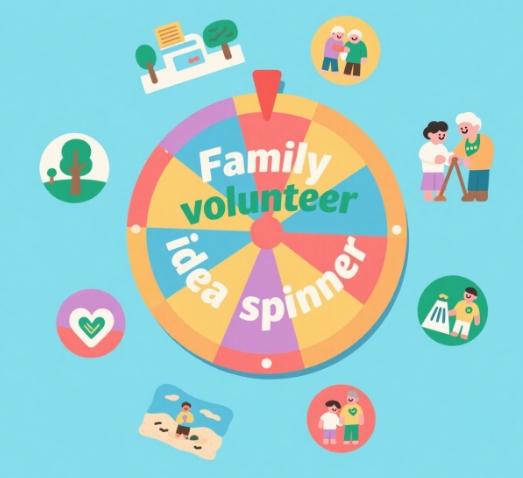In a world increasingly shaped by digital overload and disconnected routines, families are yearning for meaningful, shared experiences that cultivate empathy and togetherness. Volunteering offers precisely that — yet the question remains: how can families consistently find volunteer ideas that suit their unique skills, schedules, and values?
This is where a Family Volunteer Idea Spinner enters as a game-changing tool. By integrating chance with compassion, it turns decision-making into a moment of excitement — and purpose.
The Hidden Problem: Decision Fatigue Meets Good Intentions
Modern families are overwhelmed. A 2022 American Psychological Association survey found that over 60% of parents report chronic stress related to balancing family and responsibilities. Even with the best intentions, deciding where or how to volunteer becomes yet another mental task. Ironically, this often leads to inaction, not engagement.
Meanwhile, data from Youth Service America (2023) shows that children who engage in volunteer work with their families are 82% more likely to continue volunteering as adults. The long-term impact is profound — but it needs a spark, a system, and a sense of fun.


Transforming Choice Into a Game: Why Spinners Work
Gamified tools like a Family Volunteer Idea Spinner transform passive browsing into active discovery. Inspired by behavioral design research from Stanford’s B.J. Fogg Behavior Lab, when people are presented with micro-choices — especially in a playful, randomized format — they are 3x more likely to follow through compared to static lists or open-ended prompts.
Instead of “What should we do this weekend?”, the question becomes:
“Let’s spin the wheel and see how we can help today!”
A spinner can suggest ideas like:
- “Cook a meal for an elderly neighbor”
- “Join a park clean-up event”
- “Assemble care kits for a shelter”
- “Write letters to deployed soldiers”
- “Donate gently-used books to a library”
This variety sparks engagement across age groups and temperaments. For younger children, the suspense adds motivation. For parents, it removes the research burden.
Data-Driven Inspiration: What Families Want Most
Search analysis from non-profit engagement platforms like VolunteerMatch and Idealist reveals a growing trend:
“local family volunteering near me” and “simple volunteer activities for kids” are top rising queries since 2021.
These searches reflect three key user needs:
- Locality and accessibility — families want actions within reach.
- Time flexibility — micro-volunteering options (30 minutes to 2 hours).
- Age-appropriate tasks — activities that toddlers, teens, and adults can do together.
By integrating these filters into a volunteer idea spinner, the user isn’t just getting a suggestion — they’re getting a relevant one.
Beyond Altruism: The Ripple Effect of Family Volunteering
According to a 2021 Points of Light Foundation report, families who volunteer together report a 35% increase in perceived family cohesion, and children in these families perform better on measures of emotional intelligence and civic responsibility. This isn’t anecdotal — it’s measurable, backed by neuroscience.
Incorporating a Family Volunteer Idea Spinner into weekly routines becomes more than just a feel-good activity. It is a structure for nurturing compassion, teamwork, and shared memory.
Building the Ultimate Family Volunteer Spinner
A powerful idea spinner should:
- Allow custom categories (e.g., animal rescue, environmental, intergenerational)
- Include local API feeds to match real-time events
- Offer offline suggestions for low-tech moments
- Include badges or achievements to track family participation
- Be available in app and web formats for cross-device accessibility
This not only gamifies giving — it builds habits around kindness.
Final Spin: Purpose, Randomized
In a culture that celebrates personalization and instant access, the Family Volunteer Idea Spinner gives families both freedom and structure — spinning up spontaneous service opportunities that fit their values and schedules.
Spinthewheel transforms this concept into an elegant digital experience — playful, purposeful, and deeply human. We don’t just gamify fun — we gamify good.
About the Designer
Ella Trenton, lead content architect at Spinthewheel, is a social innovation strategist with a background in digital behavior design from the University of Michigan. With a passion for family-centered tech and community resilience, she specializes in turning complex ideas into joyful tools. Ella believes that “if you can spin it, you can start it.”